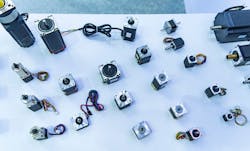Precise Motion Control with Stepper Motors
Automation engineers will find stepper motors increasingly relevant in their work due to their precise control capabilities and recent technological advancements. These motors, known for their ability to convert electrical pulses into exact mechanical movements, are essential in applications requiring accurate positioning, such as robotics, CNC machines and automated assembly lines.
The shift towards digital control systems, such as those utilizing microcontrollers and FPGAs, has significantly enhanced stepper motor performance, enabling smoother motion, less noise and improved energy efficiency, Control Design reported. Additionally, innovations in high-torque designs and closed-loop control systems have expanded the utility of stepper motors, offering higher torque in smaller packages and greater reliability through position feedback mechanisms.
The ongoing advancements in stepper motor technology also highlight important trends for automation engineers, particularly in energy efficiency, customization and integration. Modern stepper motors are now designed with energy efficiency in mind, making them suitable for green manufacturing and battery-powered devices.
Learn more about the advantages of different types of motor technologies in the full article from Control Design, an Automation World partner publication.

